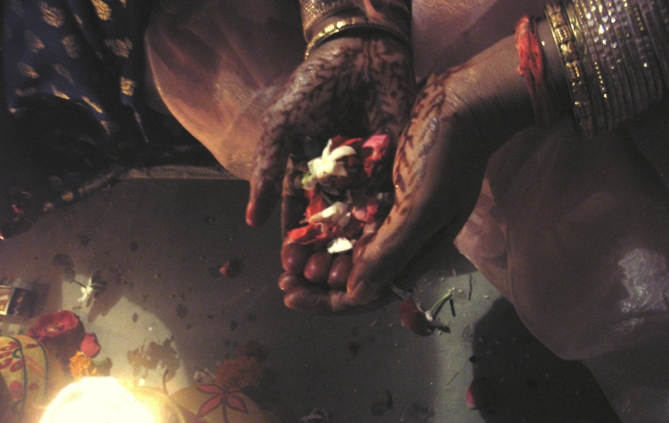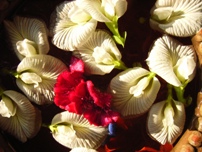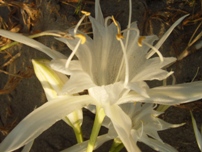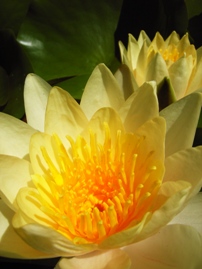
If you knew what I do about the
power of giving, you would not let a single meal go by without
taking the opportunity to give.
Buddha
~ About generosity
Generosity, or dana in Sanskrit, is a power. Traditional teachings tell us that a life of generosity forms the ideal foundation for all other spiritual growth. We nourish this power when we offer a gentle word, an open mind, or a gift of food or money. Dana flowers when we are content with things as they are, when we let go of what is not needed, and when we do not take what is not freely given to us.
The greatest gifts of all are the teachings of liberation. These gifts are priceless, and have been passed down for generations without charge. In this spirit, the facilitators and managers of Open Dharma offer our time and skills freely.
Generosity allows us to experiment with a revolutionary economic model based on voluntary giving rather than on mandatory fees. This economic system reminds us that each one of us is intrinsically valuable to the whole, supported by the whole, and responsible for the welfare of the whole. The modern custom of paying a fixed fee for a particular service or workshop can keep us isolated in our usual defensive fears related to money. Unfortunately, trying to "own" or "get our money's worth" in knowledge blocks genuine receptivity and growth. In contrast, the time-honored tradition of voluntary support for facilitators has ensured the unbroken flow of profound spiritual teachings for centuries.
The retreat fees usually cover the costs of your room and board charged by the center. On most retreats, what you pay on the first day also covers most or all of the costs involved in making the retreat happen: emails, photocopies, telephone calls and other office expenses; staff room, board and travel costs to and from the retreat; thank you gifts to our hosts, etc.
Open Dharma also needs donations towards the unseen web of support such as retreat scholarships, the website, organizational requirements like accounting, as well as help to expand the services we can offer. Some people give at the end of a retreat and others also give on a monthly basis. Without this help, Open Dharma could not continue. We are grateful that generosity keeps flowering.
Ourselves, we give freely. Teachers, retreat managers, and over 50 volunteers from over 15 countries give our time freely and joyfully to support your spiritual path in the best way we can. Teachers and retreat managers gratefully accept your financial gifts so that we can continue to dedicate our lives to offering teachings and retreats.
Open Dharma has been floating on dana for over a decade now, so it would be easy to assume it is a rich organization. But in fact it runs on what is considered in the nonprofit world to be a tiny, shoestring budget. The rare surplus goes towards scholarships, small thank you gifts to our many and invaluable volunteers, and improvements in the website like freely downloadable talks and meditations.
Facilitators and managers have other ongoing expenses,
such as rent and electricity at home, visas, medical needs, rest
between retreats, correspondence, education, personal retreats,
and airline tickets to and from retreat venues. We rely upon donations
to help us continue to offer retreats.
~ Hafiz - The Gift
Our
Union is like this.
You feel cold
So I reach for a blanket to cover
Our shivering feet.
A hunger comes into your body
So I run to my garden
And start digging potatoes.
You ask for a few words of comfort and guidance,
I quickly kneel at your side offering you
This whole book—
As a gift.
You ache with loneliness one night
So much you weep
And I say,
Here’s a rope,
Tie it around me,
Hafiz
Will be your companion
For life.
(Hafiz, The Gift, translated by Daniel Ladinsky, pg. 83.)
~ Gautama Buddha on generosity
Sutta 142 Exposition of Offerings from the Majjhima Nikaya
The Buddha’s aunt, Mahapajapati Gotami,
also raised him like a mother would, since the Buddha’s
mother died soon after his birth. Once she brought a pair of new
clothes she had spun and woven specially for him. She asked him
to accept the gift.
He replied, “Give it to the Sangha (community), Gotami.
That way the offering will be made both to me and to the community.”
She asked him two more times please to accept her gifts and two
more times he made the same reply.
Ananda, who was usually right at Buddha’s side, tried to
convince the Buddha to accept the gift: “After all, she
nursed you when your mother died, and because of your teachings,
she is virtuous, free from doubts about the way things really
are, and has entered the stream of liberation. You have both helped
each other very much.”
Buddha: “That is true. When someone owing to another has
found virtue, freedom from doubt, and the stream of liberation,
it is not easy for the receiver to repay the giver in usual ways—with
signs of respect, or with things such as clothing, food, resting
places, and medicines.
“One can give a gift to an animal, and to people with varying
degrees of wisdom.
“By giving a gift to an animal, the offering may be expected
to repay a hundredfold: the repayment may be long life, beauty,
happiness, strength, intelligence, and freedom from agitation
in a hundred existences.
“By giving to an uncaring ordinary person, the offering
may be expected to repay a thousandfold.
“A gift to a caring ordinary person would repay a hundred
thousandfold, and to a virtuous, wise person a gift would repay
a hundred thousand times a hundred thousandfold.
“A gift to one who has started on the way towards entering
the stream of liberation would repay…..immeasurably.
“What to say of a gift to one who has entered the stream?
“What to say of gifts to those who have not only entered
the stream but also stabilized in freedom, who have completed
their work?
“Ananda, one can also give gifts to some or all of the Sangha.
One may give a gift to all or may say, “Appoint a certain
number of people for me from the Sangha. Even if a gift is given
to uncaring people within the Sangha, on behalf of the Sangha,
the offering made to the Sangha is immeasurable.
“And I say that in no way does a gift to a person individually
ever have greater fruit than an offering made to the Sangha.
“An offering may be made fruitful if a virtuous person gives
with a trusting heart a gift righteously obtained, even if it
is only the virtue of the giver that makes the gift fruitful.
“If both giver and receiver are virtuous—that gift,
I say, will come to full fruition.
“When a liberated person gives to a liberated person, that
gift, I say, is the best of worldly gifts.”
~ I Ching on generosity
When what is above sacrifices itself to increase what is below,
this is out-and-out increase...True increase is without artifice....
Herein is expressed the most basic principle of leadership:
to rule is truly to serve. It is this spirit alone that has the power to help
the world. It is the way of great enlightenment; the way of great clarity.
...
Sacrifice on the part of those above for the increase of those below fills
people with a sense of joy and gratitude which is of great value to the
common well-being.
(Pg. 84, The Pocket I Ching: The Richard Wilhelm Translation)
Pay heed to nourishing what is right
And in what one seeks to nourish oneself.
As heaven and earth nourish all beings,
So a holy sage nourishes [people] of worth;
And, thereby, reaches the whole people.
...If we wish to know someone we have only to observe on whom [she or] he
bestows ... care and what sides of [her or] his nature [she or] he cultivates.
The wise one does not injure the important for the sake of the unimportant,
nor the superior for the sake of the inferior.
One who cultivated the lower parts of [her or] his nature is a small [person]:
one who cultivates the higher parts of [her or] his nature is a wise [person].
As nature nourishes all creatures, so the great [one] foster superior people
in order, through them, to nourish all people.
(Pg. 54, The Pocket I Ching: The Richard Wilhelm Translation)
~ Jesus on generosity
Matthew 6, 24-34
No one can be the slave of two masters:
One will either hate the first and love the second, or be attached
to the first and despise the second. You cannot be the servant
of both God and money.
That is why I am telling you not to worry about your life and
what you are to eat, nor about your body and what you are to wear.
Surely life is more than food, and the body more than clothing.
Look at the birds in the sky. They do not sow or reap or gather
into barns, yet your heavenly Father feeds them. Are you not worth
much more than they are? Can any of you, however much you worry,
add one single cubit to the span of life? And why worry about
clothing? Think of the flowers growing in the fields; they never
have to work or spin; yet I assure you that not even Solomon in
all his royal robes was clothed like one of these. Now if that
is how God clothes the wildflowers growing in the field which
are there today and thrown into the furnace tomorrow, will God
not much more look after you, you who have so little faith? So
do not worry; do not say, “What are we to eat? What are
we to drink? What are we to wear?” Your heavenly Father
knows you need all these things. Set your hearts on God's kingdom
first and all these other things will be given you as well. So
do not worry about tomorrow; tomorrow will take care of itself.
Each day has enough trouble of its own.
~ Margaret Miles
Margaret Miles (Emeritus Professor of Historical Theology at the Graduate Union in Berkeley, California, and formerly the Bussey Professor of Historical Theology at Harvard Divinity School), “Living Lovingly Amid Fear,” in Harvard Divinity Bulletin, Autumn, 2006, Cambridge, MA, pp. 14-17.
“Several western authors have suggested
that human beings and societies are defined by their love or their
fear. … In order to live lovingly, we must somehow refuse
to live in fear in a culture that constantly confronts us with
well-publicized dangers….
“In the last several years American daily newspapers, newscasts,
and newsmagazines have featured many causes for fear. Isolated
incidents are characterized as trends, and anecdotes are substituted
for facts….
[pg. 15:] “Moreover, there is frequently little correlation
between press attention to a danger and its statistical significance.
Americans fear the wrong things. That is the point of a culture
of fear…. For example, in 2001, over 42,000 Americans were
killed in motor vehicle accidents, while 3,547 people were killed
worldwide in terrorist attacks, 3,000 of them on September 11….My
point is not that there is no reason to fear, but that the culture
of fear in which we live often takes our attentions and energies
away from creatively addressing the problems of American society
and the world, encouraging attitudes of helplessness—or
worse, aggression.
… “Fear is hard on our bodies. Anxiety is the number
one health problem in the country, leading to epidemic depression,
alcoholism, eating disorders, and prescription drug addiction….
“Moreover, American society is violent because it is fearful.
Americans incarcerate at 14 times the rate of Japan, 8 times the
rate of France, and 6 times the rate of Canada. … On the
global level, evidence suggesting that counterterrorism activities
provoke more terrorism has not been taken seriously… [pg.
16:] It is startling that the wealthiest society in the world
does not feed its needy young, care for the old and the sick,
and assist the poor to earn a living wage. …
“Marc and Marque-Luisa Miringoff’s book, The Social
Health of the Nation: How America is Really Doing argues that
while Americans receive constant reports on the nation’s
economic health, reports on the nation’s social health are
few and episodic. Social health is measured by assessing such
factors as ‘the well-being of America’s children and
youth, the accessibility of health care, the quality of education,
the adequacy of housing, the security and satisfaction of work,
and the nation’s sense of community, citizenship, and diversity.’
…
“…But passivity, a ‘helpless victim’ mentality,
and aggression resulting from fear, can be challenged by a committed
practice of political and social engagement.
“…Love is not a state one falls into passively, as
usually represented in American media. It is something we, as
individuals and as a society, can actively make…
“…Our society’s preoccupation with romantic
love takes our attention away from noticing that loving treatment
of needy human beings, in the form of social services, health
care, and support for education, is disappearing from our society.
“…The daily practice of love requires that we acknowledge
that we live with our uncertainties rather than cater to them.
As human beings with limited knowledge and perspectives, we are
always uncertain, even about the must crucial matters. …
However, fear that we do not possess certain knowledge of the
humanly good must not be allowed to prevent our passionate commitment
to it.
“…The feminist philosopher Dorothy Dinnerstein wrote,
‘We never feel as grown-up as we expected to feel when we
were children.’ …Yet we are the grow-ups. No spirituality
should help us transcend the needy world in which we live, a world
that requires our attention, our love….”




